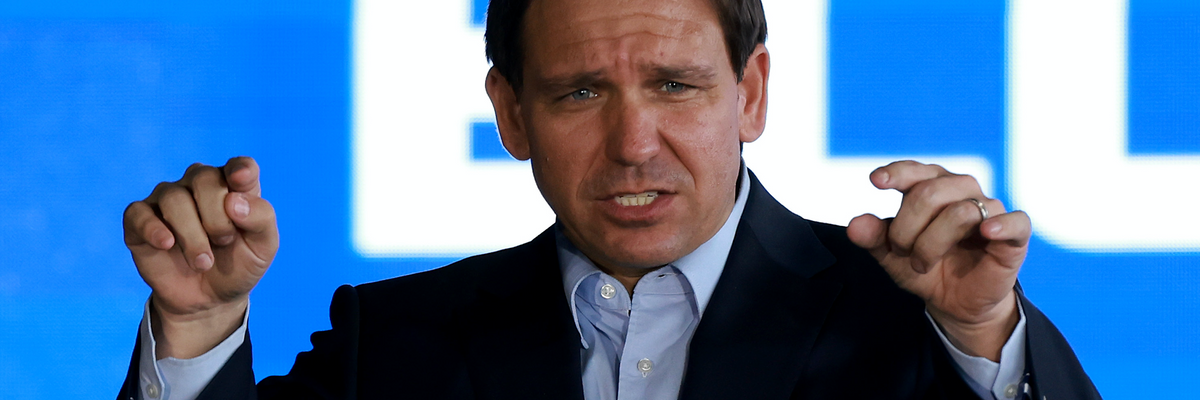A voting rights group on Wednesday sued Republican Florida Gov. Ron DeSantis and other officials for what it called "illegal intimidation" of voters by intentionally making it difficult for former felons to determine their voting eligibility and using "election police" to "mount an aggressive campaign" against people who did not know they were ineligible to cast ballots.
The lawsuit—filed in Miami federal court by Free and Fair Litigation Group, Arnold & Porter, and Weil Gotshal & Manges working pro bono on behalf of the Florida Rights Restoration Committee (FRRC) and individual voters—alleges that state election officials "have created such a bureaucratic system around the implementation of Amendment 4 that it prevents Florida citizens from voting."
"Florida's failure to accept responsibility in determining voter eligibility hurts every Florida citizen."
Amendment 4 is an FFRC-led 2018 referendum approved by nearly two-thirds of Florida voters reenfranchising 1.4 million people with past felony convictions. The stakes transcended Florida and criminal justice reform, as a botched state voter purge of purported former felons played what one federal civil rights commissioner called an "outcome determinative" role in the 2000 U.S. presidential election.
"Ever since the people of Florida passed a constitutional amendment to grant people with felony convictions a new right to vote, the governor and the state have done everything in their power to prevent those 1.4 million new voters from actually voting," Carey Dunne of the Free and Fair Litigation Group said in a statement.
Additionally, FFRC alleges that DeSantis' deployment of statewide "election police" constitutes illegal voter intimidation under the federal Voting Rights Act.
DeSantis—who is seeking the 2024 GOP presidential nomination—has faced widespread criticism for using Florida's Office of Election Crimes and Security to arrest 20 formerly incarcerated people who believed they were eligible to vote under Amendment 4 for alleged "voter fraud." Most of those arrested were Black and almost all were Democrats.
The new lawsuit alleges that DeSantis and Florida election officials failed to uphold their legal responsibilities by:
- Providing inaccurate, incomplete, or misleading information to potential voters who try to determine their voting eligibility;
- Creating a byzantine process in which voter eligibility is determined by varying local practices depending on where the potential voter lives; and
- Creating, publicizing, and deploying an "election police" unit designed to arrest people for having voted, including some people encouraged to register to vote and provided a voter ID by Florida election officials.
"Florida's failure to accept responsibility in determining voter eligibility hurts every Florida citizen," said FFRC executive director Desmond Meade.
"This is not a Black, white, Latino, Native American, Asian, or multiracial issue or a Republican or Democrat issue; this is an everybody issue," Meade added. "If Floridians cannot rely on the state to determine voter eligibility, then who can we rely on?"
The plaintiffs in the suit are seeking a declaration that "Florida's implementation of Amendment 4 is unconstitutional and illegal under the Voting Rights Act."
FRRC also requests the creation of a statewide database for prospective voters in order to determine their eligibility under Amendment 4, as well as the appointment of a federal compliance monitor.
"From the governor on down, state of Florida and local officials at every level have failed to reintegrate returning citizens who have served their time back into our democracy," Arnold & Porter pro bono counsel John A. Freedman said in a statement. "We are proud to stand with our clients and our co-counsel in this important fight."
